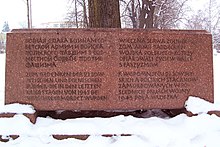| Battle of Bautzen (1945) | |||||||
|---|---|---|---|---|---|---|---|
| Part of World War II | |||||||
 Memorial in Bautzen to Polish and Soviet soldiers and civilians fallen near the town of Wuischke. | |||||||
| |||||||
| Belligerents | |||||||
|
|
| ||||||
| Commanders and leaders | |||||||
|
|
| ||||||
| Units involved | |||||||
|
|
| ||||||
| Strength | |||||||
|
50,000 300 tanks[2] 600 artillery pieces 497 armoured vehicles |
Polish Army: 80,000[2] 500 tanks[2] Soviet Army: at least 20,000 | ||||||
| Casualties and losses | |||||||
| 5,000 killed |
Polish (official): 4,902 killed,10,532 injured,2,798 missing Soviet: unknown | ||||||
The Battle of Bautzen (or Battle of Budziszyn, April 1945) was one of the last battles of the Eastern Front during World War II in Europe. It was fought on the extreme southern flank of the Spremberg-Torgau Offensive, seeing days of pitched street fighting between forces of the Polish Second Army under elements of the Soviet 52nd Army and 5th Guards Army[a] on one side and elements of German Army Group Center in the form of the remnants of the 4th Panzer and 17th armies on the other.
The battle took place during Ivan Konev's 1st Ukrainian Front's push toward Berlin, which was part of the larger Soviet Berlin Offensive. The battle was fought in the town of Bautzen (Upper Sorbian: Budyšin) (Polish: Budziszyn) and the rural areas to the northeast situated primarily along the Bautzen–Niesky line. Major combat began on 21 April 1945 and continued until 26 April, although isolated engagements continued to take place until 30 April. The Polish Second Army under Karol Świerczewski suffered heavy losses, but, with the aid of Soviet reinforcements, prevented the German forces from breaking through to their rear.
After the battle both sides claimed victory and modern views as to who won the battle remain contradictory. Because the war was almost over and the battle had no strategic impact on the ongoing Battle of Berlin, German historiography has focused more on its tactical aspects. The German operation successfully recaptured Bautzen and its surroundings, which were held until the end of the war.
According to some sources, 26 April marks the end of this battle, although less severe and isolated clashes in that region continued until 30 April.[2] Other sources note that heavy fighting still took place on 27 April, and that the German advance was only completely halted on 28 April.[3] By the end of the month, the Polish Second Army and the Soviet forces had repelled the German attack, forming a line toward Kamenz–Doberschütz–Dauban, and was preparing to launch an offensive toward Prague.[1]
As noted by historians such as Wawer and Komorowski, despite the heavy casualties, the Polish–Soviet frontline was not seriously breached, and thus the German offensive was a failure.[2][3]
- ^ a b Cite error: The named reference
Komornicki1967-134was invoked but never defined (see the help page). - ^ a b c d e f Cite error: The named reference
zwwas invoked but never defined (see the help page). - ^ a b c Cite error: The named reference
KomorowskiHistorycznych2009was invoked but never defined (see the help page).
